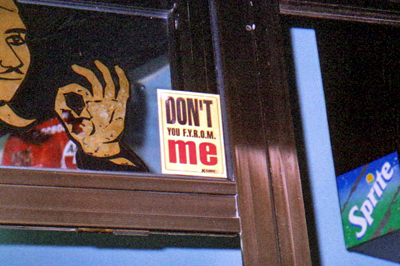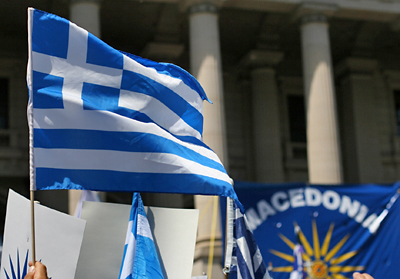Ever since Macedonia became independent from Yugoslavia in 1991, its name has been the subject of a bitter dispute with its southern neighbor, Greece. Greece claims that the use of “Republic of Macedonia”, as Macedonia calls itself in its constitution, not only violates Greece's historic cultural claim to the name, but also implies a territorial claim to the northern Greek province of Macedonia.
Instead, Greece, and the U.N. by default, have continued to call Macedonia by the name “Former Yugoslav Republic of Macedonia”. As former B92 blogger Lucy Moore points out [1], “It’s an awfully long name for a tiny country, but you can call it FYROM for short”. To which she adds: “With Greece still hung up on a name from the third century B.C., Serbia's 1389 claim to Kosovo suddenly seems more reasonable”.
 [2]
[2]
Photo by Tigertweet [3], used with permission.
Now the dispute over the name of the former Yugoslav republic could jeopardize its bid to join the EU and NATO, both of which Greece is a member. An invitation to join NATO is expected at the summit of the organization to be held in Bucharest in April, and after Kosovo's declaration of independence last month, Macedonian officials say the country (which has a sizable Albanian minority) needs membership in the security organization, and later in the European Union, to maintain stability.
However, Greece has threatened to veto Macedonia's membership bid [4] if it does not change its current name (Republic of Macedonia). In addition to NATO, Macedonia is hoping to start accession negotiations with the EU in the fall [5], based on an EU progress report released last week. The only problem could be, again, its name. In the words of the EU Enlargement Commissioner Olli Rehn, “If we can't settle this issue, I'm afraid it will have negative ramifications [for EU accession]”. Balkan Baby urges [6] both sides to reach a compromise soon for maintaining stability in the region, with more flexibility on Greece's side:
Given the current instability which looms over the entire Balkan region, it seems highly irresponsible of the Greeks, as a relatively affluent country, to try and hinder the progress of Macedonia, a poor but democratically aspiring country which unlike Serbia wishes to bring itself closer to the West and encourages stability. Greek opposition is likely to infuriate Macedonian nationalists and this in turn could lead to a repeat of the bloody clashes that occurred in 2001 against the republic's Albanian minority. It seems that it is time for Greece to step down from its pedestal and start playing a more responsible and mature role in the region, something which for sometime it has tried to avoid as it promotes itself as a Mediterranean nation rather than being part of the Balkans. Out of defiance maybe Macedonia can ask for Greece to be forced to change its name to The Former Ottoman Hellenic Republic of Athens?
Dieneke's Anthropology Blog describes [7] at great length the intricacies of the name issue, explaining why both sides have a right to the name:
The dispute centers around the issue of the use of the adjective “Macedonian”. This adjective has a geographical sense, describing someone who is from the geographical region of Macedonia. However, for the inhabitants of FYROM [Former Yugoslav Republic of Macedonia], it also has an ethnic sense, since many (or most) Slavic-speaking inhabitants of FYROM consider themselves to be Macedonian in an ethnic sense. […]
-The people of Greece are justified in wanting to deny exclusive rights to the Macedonian name to FYROM, because FYROM encompasses only part of Macedonia: geographically, the northern part; genetically, a subset of the Macedonian blood; linguistically, a Slavic dialect of the Macedonian region.
-The people of FYROM are justified in wanting to have some rights to the name Macedonian: they inhabit parts of Macedonia, they speak a Macedonian dialect of the Slavic group, and they have come to think of themselves as a separate nation from other Balkan Slavs.
 [8]
[8]
Demonstration in Thessaloniki for the name change of the Republic of Macedonia. Photo by Pappalicious [9], used under a Creative Commons license.
Both Macedonian and Greek bloggers feel very strongly about the name issue, which external observers like Greater Surbiton [10], find hard to understand:
…it may be difficult for a sane person to understand what is happening here: try to imagine the English fighting with the Welsh over whether Boadicea was ‘English’ or ‘Welsh’, or with the French over whether Richard the Lionheart was ‘English’ or ‘French’. Try to imagine the French fighting with the Germans over whether Charlemagne was ‘French’ or ‘German’. This is something that no mature, democratic nation would do. Yet in the twenty-first century, it is apparently possible for NATO expansion and Balkan stability to be jeopardized over something like this. In fact, the implications are even more dangerous: if Slavs are not allowed to share in the heritage of Alexander the Great, are British citizens of West Indian or Asian origin allowed to share in the heritage of Boadicea or Richard the Lionheart ? Are German Jews allowed to share in the heritage of Frederick Barbarossa, or Italian Jews in the heritage of Julius Caesar?
UN envoy Matthew Nimetz, who is tasked with helping Athens and Skopje find a solution to their 17-year-old dispute, has been busy since last month, negotiating the search for a name acceptable to both sides. He recently presented a set of 5 possible alternative names and has been meeting representatives of both countries. The proposed names [11] were: Constitutional Republic of Macedonia, Democratic Republic of Macedonia, Independent Republic of Macedonia, New Republic of Macedonia and Republic of Upper Macedonia. The proposals were not very well received: a few Macedonian blogs circulated petitions [12] against a name change, thousands of people protested in Macedonia [13], and there have been similar demonstrations in Thessaloniki, the capital of Macedonia in northern Greece.
The blog Say:Macedonia [14], whose author considers that “it is a basic human right to choose a name for yourself and to express your nationality,” comments on one of the most popular proposals amongst Greek media in an open letter to UN envoy Mathew Nimetz:
In relation to “Upper Macedonia”, while the Greek government has indicated its willingness to agree to this name (as the Greek media has reported in the last few days), it should be pointed out that this name is inconsistent with its official position. If an “Upper Macedonia” exists then logically there is also a “Lower Macedonia.” Therefore having this in mind, how can the Greek government argue, among other things, that the name “Republic of Macedonia” has irredentist claims on northern Greece, but the name “Upper Macedonia” would not?
 [15]
[15]
The Macedonian flag over the town of Ohrid
(Photo by rtw2007 [16], used with permission)
As NATO's summit in April is approaching, time is running out for a deal between Skopje and Athens to solve the 17-year-long dispute, so a few bloggers have made themselves useful by suggesting alternative solutions to the dispute. Here is Greek blogger's Eugenia Loli-Queru [17] idea:
The solution is to make both countries, a single country. Call it “Macedonia and Greece”, or call it “Macedreece” or call it “Greedonia”, I don’t really care. The point is, these two cultures have MORE in common than they think they do. Ancient Macedonians were very similar in their culture and religion with the rest of Greece. It takes guts to merge two countries, but it has been done in the past, and it can be done again, peacefully. […]
My final argument is this: both cultures adore Great Alexander, and each one wants the hero to be their exclusive hero. And yet, all Great Alexander wanted for both, was a united Macedonia-Greece. By not having the wisdom to merge after 2,500 years, neither of you deserve him as its hero.
Other bloggers like Florian Bieber [18] think that, following Macedonia's name proposals, generally republics should be required to add meaningful descriptive adjectives to their names:
“Smallish Republic of Montenegro” (SROCG)
“Kinda Democratic Republic of Serbia” (KDROS)
“Democratic Federal and Sometimes Confederal Republic of Three Equal Constituent People and Nobody Else of Bosnia and Herzegovina” (DFSCRTECPNEBH)
Now there's even a Facebook group [19] where you can contribute to finding a solution for the dispute by suggesting a suitable adjective for Macedonia, which includes proposals like Post-Modern Republic of Macedonia (PoMoSoMa), The Not Even Remotely, Honestly not even a little bit, Hellenic Republic of Macedonia (NERHNELBHRM) or Ajvarska Republika Makedonija (ARM).